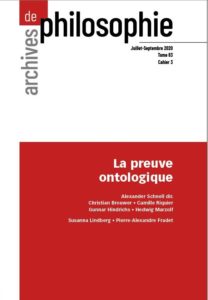 Volume 83, Issue 3, July-September 2020
Volume 83, Issue 3, July-September 2020
The ontological argument
 Alexander Schnell, The ontological argument. A Foreword
Alexander Schnell, The ontological argument. A Foreword
Christian de Brouwer, Anselm’s argument. From thought to necessity
This study attempts to understand Anselm’s argument in the context of the author’s body of work. After explaining the process of the argument, it aims to re-examine Anselm’s project, first in the Proslogion, and then in relation to the discursive approach in the Monologion. What emerges is an attempt by the rational creature to elevate itself toward God by rationally thinking about its creator’s mode of existence. In the process, it experiments with and identifies the limits of its intelligence.
Camille Riquier, Descartes, Spinoza, and ontological proof
This paper aims to reintegrate Spinoza into the history of proofs of God’s existence and, to this end, to examine the Cartesianism of Spinoza.
Gunnar Hindrichs, The ontological argument as self-reflection of thought
The ontological argument for the existence of God is not just an argument for the existence of God. It is the reflection of thought upon its own conditions, foundations, and limits. This essay investigates this self-reflection of thought, with a particular focus on Kant’s version of ontological proof. It claims that the ontological argument consists in the de-potentialization of thought by itself.
Hedwig Marzolf, The strange return of ontological proof in Kant
This article seeks to understand why Kant offers ontological proof of the existence of God in Opus postumum after having given it up in the Critique of Pure Reason. It initially clarifies the importance of Schwärmer’s criticism, which maintains that religion is not a concern of reason. It then looks into the ways that Kant responds to Schwärmer, by establishing an analytical link between God and moral law in the Critique of Practical Reason, and by setting up theology as a “supreme principle” of transcendental philosophy in Opus postumum. It concludes that God exists in the recognition of the subject in the world.
Alexander Schnell, Ontological arguments in phenomenology
This contribution evaluates the relevance of dealing with ontological arguments in phenomenology. The author first establishes the link between the ontological argument (in phenomenology) and phenomenological construction before highlighting the link between transcendental « constitutive » operations and their correlated « being. » Five dimensions of « inappearance » are then put forward: the world, reality, experience (in its categoriality), meaning, and genesis (of factuality). On this basis, the author deploys the precise different forms of the « ontological argument » at work according the five modalities of the transcendental.
* * *
Susanna Lindberg, The fall and chance of nature: Schelling, Hegel, and after
This paper offers an overview of the stakes of the philosophy of nature in German idealism. It shows why Hegel’s philosophy of nature should not be read only as the fall of the idea in a spiritless exteriority, but also as the chance of the spirit that wants to consider reality as such. It compares this to the opposition between gravity and light in Schelling’s philosophy of nature, and finally makes a hypothesis about the utility of Naturphilosophie today.
Pierre-Alexandre Fradet, The virtues of common sense in Bergson
A concept with many meanings, Bergson views common sense as relating sometimes to the content of naive beliefs, but also sometimes to the effort made to differentiate between beliefs. By sticking closely to these two meanings, we here aim to shed light on the philosophical importance that Bergson sometimes attributes to common sense. More precisely, the aim will be to emphasize how positive Bergson’s conception of common sense can be when he associates it with wisdom and the disposition for changing one’s mind, that is, the capacity to adapt our beliefs to the particularities of reality.
